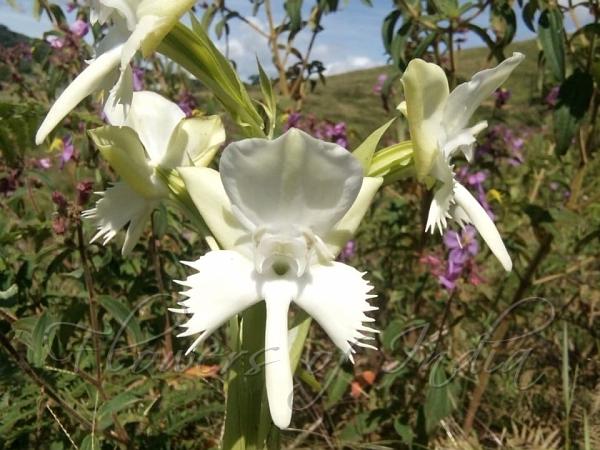|
| East-Asian Egret Flower |
|

|

|
|
|
|
Photo: |
Botanical name: Pecteilis susannae Family: Orchidaceae (Orchid family)
Synonyms: Habenaria susannae, Orchis susannae, Platanthera susannae
Synonyms: Habenaria susannae, Orchis susannae, Platanthera susannae
East-Asian Egret Flower is a large to giant sized, hot
to cold growing terrestrial orchid with large fragrant white flowers.
It was named for the wife of Rumphius, 17th century Dutch botanist. The
plant gives rise to an erect, thick, leafy stem with basal sheaths and
carrying, many, distant, ovate-oblong, pointed, stalkless leaves. The
plant blooms in the late spring, summer and fall on a umbel-like, laxly
3 to 5 flowered inflorescence with lanceshaped, pointed to tapering,
minutely glandular velvet-hairy floral bracts and carrying nocturnally
fragrant flowers. Flowers are large; flower-stalk and ovary 4-6 cm,
shallowly winged, hairless. Dorsal sepal erect, broadly ovate to round,
2.5-3 x 2-2.8 cm, tip blunt-rounded; lateral sepals spreading, broadly
ovate, slightly oblique, 2.5-4 x 1.2-2.2 cm, usually slightly longer
than dorsal sepal, tip blunt. Petals are linear-lanceshaped, 7-12 x
about 2.5 mm; lip irregularly ovate, 2.5-4.0 x 2.5-4.4 cm; lateral
lobes broad, subflabellate, 1.6-2.2 x 1.8-2.4 cm, lateral margins
entire, apical margin lacerate-fringed; mid-lobe linear-oblong, 18-30 x
4-6 mm, slightly fleshy, entire; spur straight to gradually curved
forward, 6-13 cm x 3-5 mm, tip pointed. East-Asian Egret Flower is found
in East Himalaya, from Nepal to NE India, S China and SE Asia, at
altitudes of 500-2500 m. Flowering: July-September.
| Identification credit: Pankaj Kumar | Photographed in Piulong village, Tamenglong distt., Manipur. |
• Is this flower misidentified? If yes,